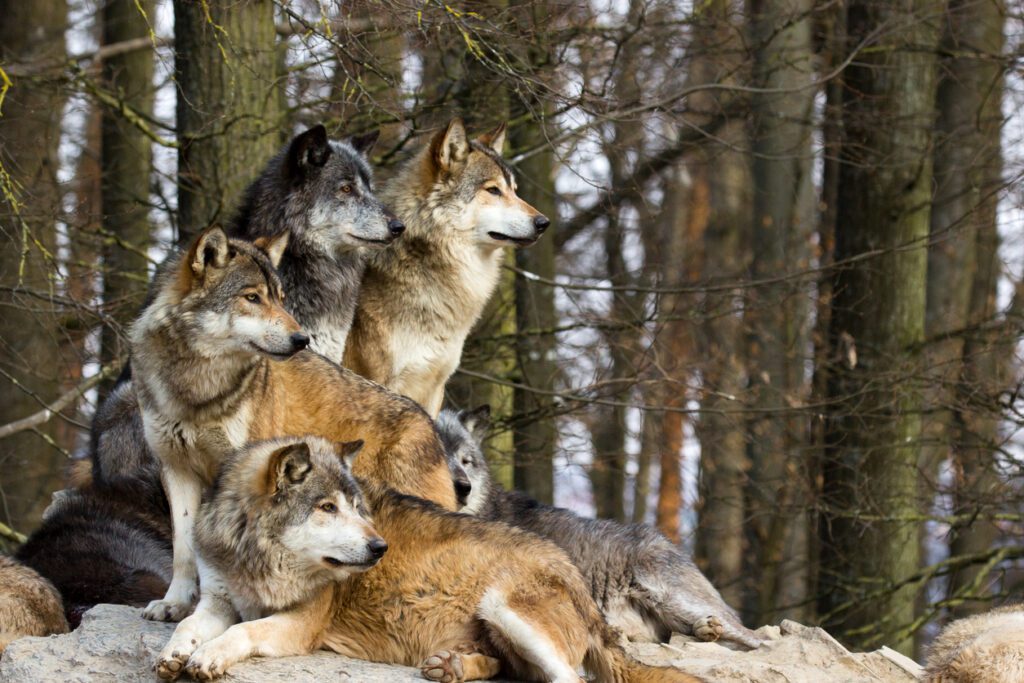In my quest to find the perfect topics to write about each week, I embark on a deep dive into the vast world of my interests. Armed with a steaming cup of coffee and an eager mind, I began scouring reputable news sites for emerging trends and innovations. Simultaneously, I immersed myself in online communities of environmental activists, where passionate debates and current issues unfolded before my eyes. First and foremost, my love for dogs nudges me to fellow dog lovers, uncovering shared challenges and heartwarming tales. I found inspiration from Born Free USA’s website as the puzzle pieces came together. This week, October 20-26, is National Wolf Awareness Week. So I am happy to share with you what I have learned about National Wolf Awareness Week.
This week, October 20-26, National Wolf Awareness Week is celebrated—a crucial opportunity to reflect on the majestic creatures that have roamed our landscapes for centuries. Yet, for too long, wolves have been misunderstood and mistreated, leading to dire consequences for their populations. Today, let’s uncover the truth about wolves and urgently advocate for their protection together.
The History of Wolves in the United States
Imagine a time when wolves roamed freely across the United States, their howls echoing through the forests. Sadly, this idyllic vision was shattered in the early 1900s when widespread misinformation painted wolves as dangerous predators. This led to their mass persecution and near extinction.
Two prominent species, the gray wolf and the red wolf, call the U.S. home. The red wolf is now the rarest large carnivore in the country, teetering on the brink of extinction. By the 1970s, the situation was so dire that wolves were designated the most endangered species in the U.S., thanks to the 1973 Endangered Species Act (ESA). This landmark legislation gave them much-needed legal protection, offering a lifeline to these incredible animals.
Yet, the battle for wolf conservation has been a rollercoaster. In 2011, congressional action removed protections for gray wolves in Idaho and Montana, setting a precedent for legislative interference in wildlife conservation. Fast-forward to 2019, the Trump administration stripped gray wolves of federal protection nationwide, exposing them to renewed threats, including unregulated hunting.
Despite a 2022 federal ruling overturning this decision, wolves in the Northern Rocky Mountain states remain vulnerable. Recent efforts by the U.S. Fish and Wildlife Service (USFWS) to develop a National Recovery Plan for gray wolves are a positive step. Still, more action is needed to ensure their survival.
Wolves as Keystone Species
Wolves are not just another species but keystone species crucial in maintaining ecological balance. By regulating herbivore populations like deer and elk, they prevent overgrazing, which allows vegetation to flourish and supports diverse ecosystems.
Note: What is a Keystone Species? A keystone species is an organism that plays a critical role in maintaining the stability and diversity of an ecosystem, even though it may not be the most abundant species in the community. Removing a keystone species can cause events that significantly alter the ecosystem’s structure and biodiversity.
https://www.google.com/search?client=firefox-b-1-d&q=what+is+a+Keystone+Species
Yellowstone National Park is a prime example of what happens when wolves disappear. When hunting nearly eradicated wolves in the early 1900s, the ecosystem suffered. Elk populations exploded, leading to overgrazing and adverse effects on plants, songbirds, beavers, and even fish. This underscores the essential role wolves play in their ecosystems.
Working to Protect Wolves
At Born Free USA, they’re committed to safeguarding wolves and other wildlife. They work tirelessly to strengthen legislation like the ESA and advocate for new laws to protect animals from trophy hunting, killing contests, and trapping.
How We Can Help
- Share this article: Help spread the word about the plight of wolves and the impact of policy changes. Your voice matters and can make a difference.
- Support conservation organizations: Consider donating or volunteering with groups dedicated to wolf protection.
- Advocate for policy change: Encourage local and national politicians to support comprehensive protection and recovery plans for wolves.
- Educate others: Share the importance of wolves in ecosystems and the need for their preservation.
Wolves are vital to our natural world, and their survival depends on our collective efforts. Let’s stand together during National Wolf Awareness Week and beyond to ensure these magnificent creatures continue roaming our landscapes for generations. Share their story, support conservation efforts, and advocate for their protection. Together, as a united front, we can make a difference for these incredible animals.
References:
Born Free USA. Celebrating National Wolf Awareness Week: Honoring These Essential Keystone Species. by Devan Schowe in Blog, Canids, Endangered Species, ESA on October 17, 2024. https://www.bornfreeusa.org/2024/10/17/celebrating-national-wolf-awareness-week-honoring-these-essential-keystone-species/
(2006). BOOKS OF NOTE. Environment: Science and Policy for Sustainable Development. https://doi.org/10.3200/envt.48.4.44-45
Keystone Conservation Inc | Mightycause. https://www.mightycause.com/organization/Keystone-Conservation
Keller, S. (2021). Islands in the Stream. Framework, 62(2), 149-162.
How can I contribute to biodiversity conservation?. https://www.gardenproject.design/post/how-can-i-contribute-to-biodiversity-conservation
Thank you for reading this blog post. If you have any questions or comments, please leave them in the Comments section below.
Copyright © 2019. I Don’t Know All The Answers, Nikki Mastro.
All of my photographs and documents are Copyrighted.
The main photo included in this blog post is from the iStock.com library.
No part of this website, including text, photographs, and documents, may be reproduced, stored in a retrieval system, or transmitted in any form or by any means without written permission from the copyright holder. All unauthorized use is strictly prohibited. If you choose to copy or share any information from my site, you must provide a link to the source. I appreciate your cooperation.
For further information concerning “I Don’t Know All The Answers.”
– Website and Blog: https://www.idontknowalltheanswers.com
– Facebook: https://www.facebook.com/Nikki.L.Mastro/
– Instagram: https://www.instagram.com/i_dont_know_all_the_answers/
– Linkedin: https://www.linkedin.com/in/nikki-mastro-05455a3a/
– Youtube Channel: https://www.youtube.com/@idontknowalltheanswers1954

